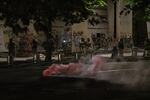UPDATE (5:22 p.m. PT) — U.S. District Court Judge Michael Mosman rejected an effort by Oregon's attorney general to restrict federal law enforcement agencies as they police protests in downtown Portland.

Federal officers deploy tear gas against people protesting racism and police violence in front of the Mark O. Hatfield federal courthouse in Portland, Ore., on July 18, 2020. The federal police presence in Portland has galvanized protesters, bringing out larger crowds than in preceding weeks.
Jonathan Levinson / OPB
Oregon asked a judge to make federal officers identify themselves and their agency before arresting or detaining a person and to prohibit arrests that lack probable cause.
In his 14-page ruling, Mosman said the state lacked standing to bring the case, in part because Attorney General Ellen Rosenblum failed to show the interests of the state of Oregon itself had been harmed.
“In the first place, although it involves allegations of harm done to protesters by law enforcement, no protester is a plaintiff here,” Mosman stated in his written order. “In the second place, it is not seeking redress for any harm that has been done to protesters. Instead, it seeks an injunction against future conduct, which is also an extraordinary form of relief.”
In a statement, Rosenblum said she was disappointed in Mosman’s decision, noting that her goal was to ensure people’s rights are protected.
“While I respect Judge Mosman, I would ask this question: If the state of Oregon does not have standing to prevent this unconstitutional conduct by unidentified federal agents running roughshod over her citizens, who does?” Rosenblum asked. “Individuals mistreated by these federal agents can sue for damages, but they can’t get a judge to restrain this unlawful conduct more generally. Today’s ruling suggests that there may be no recourse on behalf of our state, and if so that is extremely troubling.”
Since late May, protesters in Portland have taken to the streets to protest police violence and racism in the criminal justice system. But in recent weeks, the role of federal law enforcement officers sent to the city by President Trump has drawn widespread criticism.
Related: Federal Law Enforcement Use Unmarked Vehicles To Grab Protesters Off Portland Streets
OPB first reported on the case of Mark Pettibone, who was pulled into an unmarked vehicle by federal law enforcement during the early morning hours of July 15. Pettibone says his beanie was pulled over his eyes so he couldn't see where he was being taken. He was ultimately taken to the federal courthouse where he was searched and photographed. Pettibone was ultimately released after he declined to answer questions and asked for an attorney.
At a hearing this week, Rosenblum and her legal team argued before Mosman that federal officers in Portland were violating the First, Fourth and Fifth Amendment rights of Oregonians by arresting protesters off the streets in unmarked vehicles, without wearing identification and without a warrant or probable cause.
“The State simply does not have enough evidence that those unlawful seizures are likely to continue,” Mosman stated. “It has presented no evidence of any official orders or policies and has presented no evidence that these allegedly illegal seizures are a widespread practice. Despite the broad language in the complaint, Oregon has shown — at most — that this type of seizure has happened twice.”
In addition to Pettibone, a video posted to social media also on July 15 shows federal officers dressed like soldiers approaching a person and guiding them into an unmarked van in downtown Portland.
Mosman noted several times the state evidence was thin. He stated that Rosenblum presented just one example of an arrest without probable cause and one example of an unreasonable seizure.
Related: Judge restricts force federal officers can use in Portland
“That is the sum total of the evidence before me that underpins the legal injuries the State asserts in its brief and that I address below,” Mosman wrote. “Notably, the State does not request any relief with respect to Defendants’ use of unmarked vans, a fact that has been widely reported in both local and national media."
For that reason, Mosman stated his legal analysis and ruling would disregard any discussion of unmarked vehicles by federal law enforcement officers.
“The relief sought here has only to do with verbal identification by officers and probable cause, and my analysis focuses on that relief alone,” he wrote.
Mosman noted that the state may have an interest in protecting citizens from unlawful seizures. But he states that it’s not something that the attorney general fleshed out either in the briefing or during oral argument.
“Presumably, the State’s theory is that the State of Oregon is harmed when its citizens are subjected to widespread unlawful seizures of their persons,” he wrote.
During Wednesday’s arguments, Deputy Assistant Attorney General David Morrell said the federal law enforcement agencies were contending with a critical situation.
“The situation on the ground is dangerous and volatile,” Morrell said, citing unspecified injuries to federal officers and damage to federal buildings including the Mark O. Hatfield Courthouse.
Last week, the Federal Protective Service put up a new fence surrounding the federal courthouse. Documents show the federal government could want it there until 2021 to guard against broken windows and graffiti along the courthouse's facade.
OPB’s Meerah Powell contributed reporting.
